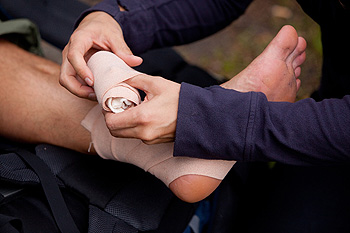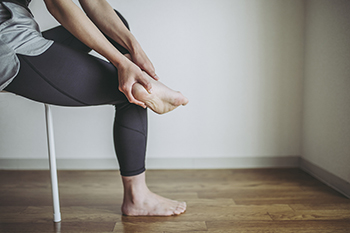Items filtered by date: August 2021
What Is Infectious Arthritis?
 Infectious arthritis is a sudden and painful form of arthritis caused by bacterial, viral, or fungal infections. This type of arthritis typically only affects one joint and can be caused by an infection spreading from one part of your body to the joint or joint lining, or by an infection-causing germ entering the body through open wounds, injections, or surgery. The symptoms of infectious arthritis include intense swelling, pain, fever, and chills. Although infectious arthritis usually affects the knees, it can also attack hips, wrists, and ankles. If you have symptoms of infectious arthritis in your ankle, a podiatrist may be able to help. For more information about the different types of arthritis, the effects of arthritis on your feet, and how to care for arthritic feet and ankles, please consult with a podiatrist.
Infectious arthritis is a sudden and painful form of arthritis caused by bacterial, viral, or fungal infections. This type of arthritis typically only affects one joint and can be caused by an infection spreading from one part of your body to the joint or joint lining, or by an infection-causing germ entering the body through open wounds, injections, or surgery. The symptoms of infectious arthritis include intense swelling, pain, fever, and chills. Although infectious arthritis usually affects the knees, it can also attack hips, wrists, and ankles. If you have symptoms of infectious arthritis in your ankle, a podiatrist may be able to help. For more information about the different types of arthritis, the effects of arthritis on your feet, and how to care for arthritic feet and ankles, please consult with a podiatrist.
Arthritis can be a difficult condition to live with. If you are seeking treatment, contact Jordan S. Steinberg, DPM from Florham Park Podiatry . Our doctor can provide the care you need to keep you pain-free and on your feet.
Arthritic Foot Care
Arthritis is a term that is commonly used to describe joint pain. The condition itself can occur to anyone of any age, race, or gender, and there are over 100 types of it. Nevertheless, arthritis is more commonly found in women compared to men, and it is also more prevalent in those who are overweight. The causes of arthritis vary depending on which type of arthritis you have. Osteoarthritis for example, is often caused by injury, while rheumatoid arthritis is caused by a misdirected immune system.
Symptoms
- Swelling
- Pain
- Stiffness
- Decreased Range of Motion
Arthritic symptoms range in severity, and they may come and go. Some symptoms stay the same for several years but could potentially get worse with time. Severe cases of arthritis can prevent its sufferers from performing daily activities and make walking difficult.
Risk Factors
- Occupation – Occupations requiring repetitive knee movements have been linked to osteoarthritis
- Obesity – Excess weight can contribute to osteoarthritis development
- Infection – Microbial agents can infect the joints and trigger arthritis
- Joint Injuries – Damage to joints may lead to osteoarthritis
- Age – Risk increases with age
- Gender –Most types are more common in women
- Genetics – Arthritis can be hereditary
If you suspect your arthritis is affecting your feet, it is crucial that you see a podiatrist immediately. Your doctor will be able to address your specific case and help you decide which treatment method is best for you.
If you have any questions, please feel free to contact our office located in Florham Park, NJ . We offer the newest diagnostic and treatment technologies for all your foot care needs.
What Is Plantar Fasciitis and Where Does It Occur?
The plantar fascia is the band of tissue on the soles of the feet that connect the front of the foot with the arch and the heel. When that tissue becomes inflamed due to stress or excessive stretching, plantar fasciitis can occur. Factors that can contribute to plantar fasciitis may include prolonged standing without proper footwear support, being overweight, having flat feet, high arches, or tight calf muscles. Pain from plantar fasciitis is often worse after sitting for a long period of time or in the morning, because the plantar fascia can contract while you are inactive or sleeping. If you have heel pain, it is suggested you make an appointment with a podiatrist who can examine you to make a proper diagnosis, and help treat whatever condition you may have using a variety of treatments and therapies.
Plantar fasciitis can be very painful and inconvenient. If you are experiencing heel pain or symptoms of plantar fasciitis, contact Jordan S. Steinberg, DPM from Florham Park Podiatry . Our doctor can provide the care you need to keep you pain-free and on your feet.
What Is Plantar Fasciitis?
Plantar fasciitis is the inflammation of the thick band of tissue that runs along the bottom of your foot, known as the plantar fascia, and causes mild to severe heel pain.
What Causes Plantar Fasciitis?
- Excessive running
- Non-supportive shoes
- Overpronation
- Repeated stretching and tearing of the plantar fascia
How Can It Be Treated?
- Conservative measures – anti-inflammatories, ice packs, stretching exercises, physical therapy, orthotic devices
- Shockwave therapy – sound waves are sent to the affected area to facilitate healing and are usually used for chronic cases of plantar fasciitis
- Surgery – usually only used as a last resort when all else fails. The plantar fascia can be surgically detached from the heel
While very treatable, plantar fasciitis is definitely not something that should be ignored. Especially in severe cases, speaking to your doctor right away is highly recommended to avoid complications and severe heel pain. Your podiatrist can work with you to provide the appropriate treatment options tailored to your condition.
If you have any questions please feel free to contact our office located in Florham Park, NJ . We offer the newest diagnostic and treatment technologies for all your foot and ankle needs.
Read more about Plantar FasciitisWhy Live with Pain and Numbness in Your Feet?
Finding Pain Relief From Sever’s Disease
 The pain from the foot condition that is known as Sever's disease can cause severe discomfort, despite the fact that it typically doesn’t last long. This is an ailment that generally affects young teenagers who are physically active and involves the growth plate in the heel. It is referred to as a painful bone disorder and happens as the heel bone grows faster than the surrounding tendons and muscles. Common symptoms that many patients experience can include heel pain, swelling, tightness, and the area may appear to be bruised. Mild relief may be found when that activity that caused this ailment is temporarily ceased, and the foot is frequently elevated. It can be beneficial to strengthen the foot by performing specific calf stretches. This can help to increase the flexibility of the muscles that are connected to the heel. If your child is physically active and begins limping, it is strongly suggested that you consult with a podiatrist who can effectively treat Sever’s disease.
The pain from the foot condition that is known as Sever's disease can cause severe discomfort, despite the fact that it typically doesn’t last long. This is an ailment that generally affects young teenagers who are physically active and involves the growth plate in the heel. It is referred to as a painful bone disorder and happens as the heel bone grows faster than the surrounding tendons and muscles. Common symptoms that many patients experience can include heel pain, swelling, tightness, and the area may appear to be bruised. Mild relief may be found when that activity that caused this ailment is temporarily ceased, and the foot is frequently elevated. It can be beneficial to strengthen the foot by performing specific calf stretches. This can help to increase the flexibility of the muscles that are connected to the heel. If your child is physically active and begins limping, it is strongly suggested that you consult with a podiatrist who can effectively treat Sever’s disease.
Sever's disease often occurs in children and teens. If your child is experiencing foot or ankle pain, see Jordan S. Steinberg, DPM from Florham Park Podiatry . Our doctor can treat your child’s foot and ankle needs.
Sever’s Disease
Sever’s disease is also known as calcaneal apophysitis, which is a medical condition that causes heel pain I none or both feet. The disease is known to affect children between the ages of 8 and 14.
Sever’s disease occurs when part of the child’s heel known as the growth plate (calcaneal epiphysis) is attached to the Achilles tendon. This area can suffer injury when the muscles and tendons of the growing foot do not keep pace with bone growth. Therefore, the constant pain which one experiences at the back of the heel will make the child unable to put any weight on the heel. The child is then forced to walk on their toes.
Symptoms
Acute pain – Pain associated with Sever’s disease is usually felt in the heel when the child engages in physical activity such as walking, jumping and or running.
Highly active – Children who are very active are among the most susceptible in experiencing Sever’s disease, because of the stress and tension placed on their feet.
If you have any questions, please feel free to contact our office located in Florham Park, NJ . We offer the newest diagnostic and treatment technologies for all your foot and ankle injuries.
Foot Care For Men
 Though foot care products and services are often marketed to women, having a good foot care routine is highly beneficial for everybody. Taking care of your feet improves their hygiene and overall well being. At home, you can soak your feet in a basin of warm water, exfoliate the heels and balls of your feet with a pumice stone to remove dry, dead skin, moisturize your feet with lotion, and clip your toenails straight across to prevent ingrown nails. You may want to give yourself a foot massage, which can help alleviate aches and pains, stretch the feet, and aid in relaxation. Taking time to pay attention to your feet can also help you detect if there are any problems, such as athlete’s foot, heel pain, or an injury. If you notice a foot problem, it is suggested that you seek the care of a podiatrist.
Though foot care products and services are often marketed to women, having a good foot care routine is highly beneficial for everybody. Taking care of your feet improves their hygiene and overall well being. At home, you can soak your feet in a basin of warm water, exfoliate the heels and balls of your feet with a pumice stone to remove dry, dead skin, moisturize your feet with lotion, and clip your toenails straight across to prevent ingrown nails. You may want to give yourself a foot massage, which can help alleviate aches and pains, stretch the feet, and aid in relaxation. Taking time to pay attention to your feet can also help you detect if there are any problems, such as athlete’s foot, heel pain, or an injury. If you notice a foot problem, it is suggested that you seek the care of a podiatrist.
Everyday foot care is very important to prevent infection and other foot ailments. If you need your feet checked, contact Jordan S. Steinberg, DPM from Florham Park Podiatry . Our doctor can provide the care you need to keep you pain-free and on your feet.
Everyday Foot Care
Often, people take care of their bodies, face and hair more so than they do for their feet. But the feet are a very important aspect of our bodies, and one that we should pay more attention to. Without our feet, we would not be able to perform most daily tasks.
It is best to check your feet regularly to make sure there are no new bruises or cuts that you may not have noticed before. For dry feet, moisturizer can easily be a remedy and can be applied as often as necessary to the affected areas. Wearing shoes that fit well can also help you maintain good foot health, as well as making it easier to walk and do daily activities without the stress or pain of ill-fitting shoes, high heels, or even flip flops. Wearing clean socks with closed shoes is important to ensure that sweat and bacteria do not accumulate within the shoe. Clean socks help to prevent Athlete’s foot, fungi problems, bad odors, and can absorb sweat.
If you have any questions please feel free to contact our office located in Florham Park, NJ . We offer the newest diagnostic and treatment technologies for all your foot and ankle needs.
Read more about Everyday Foot CareCauses and Signs of an Ankle Sprain
 An ankle sprain occurs when one or more ligaments in the ankle are overstretched or torn. This can occur due to a sudden twisting or rolling of the ankle, and is especially common in people who participate in sports that involve a lot of running or jumping. Symptoms of an ankle sprain include pain, swelling, tenderness, bruising, stiffness, ankle joint instability, and difficulty bearing weight or walking. The severity of symptoms varies based on the extent of the injury. A mild grade 1 sprain usually means that a ligament is overstretched, while a grade 3 sprain is severe and indicates a torn ligament. If you have sprained your ankle, please see a podiatrist as soon as possible.
An ankle sprain occurs when one or more ligaments in the ankle are overstretched or torn. This can occur due to a sudden twisting or rolling of the ankle, and is especially common in people who participate in sports that involve a lot of running or jumping. Symptoms of an ankle sprain include pain, swelling, tenderness, bruising, stiffness, ankle joint instability, and difficulty bearing weight or walking. The severity of symptoms varies based on the extent of the injury. A mild grade 1 sprain usually means that a ligament is overstretched, while a grade 3 sprain is severe and indicates a torn ligament. If you have sprained your ankle, please see a podiatrist as soon as possible.
Although ankle sprains are common, they aren’t always minor injuries. If you need your ankle injury looked at, contact Jordan S. Steinberg, DPM from Florham Park Podiatry . Our doctor can provide the care you need to keep you pain-free and on your feet.
How Does an Ankle Sprain Occur?
Ankle sprains are the result of a tear in the ligaments within the ankle. These injuries may happen when you make a rapid shifting movement while your foot is planted. A less common way to sprain your ankle is when your ankle rolls inward while your foot turns outward.
What Are the Symptoms?
- Pain at the sight of the tear
- Bruising/Swelling
- Ankle area is tender to touch
- In severe cases, may hear/feel something tear
- Skin discoloration
Preventing a Sprain
- Wearing appropriate shoes for the occasion
- Stretching before exercises and sports
- Knowing your limits
Treatment of a Sprain
In many cases, the RICE method (Rest, Ice, Compression, and Elevate) is used to treat ankle sprains. However, you should see a podiatrist to see which treatment option would work best with your injury. In severe cases, surgery may be required.
It is important to ask your doctor about rehab options after you receive treatment for your injury. Stretching, strength training, and balance exercises may help the ankle heal while also preventing further injury.
If you have any questions, please feel free to contact our office located in Florham Park, NJ . We offer the newest diagnostic and treatment technologies for all your foot care needs.


